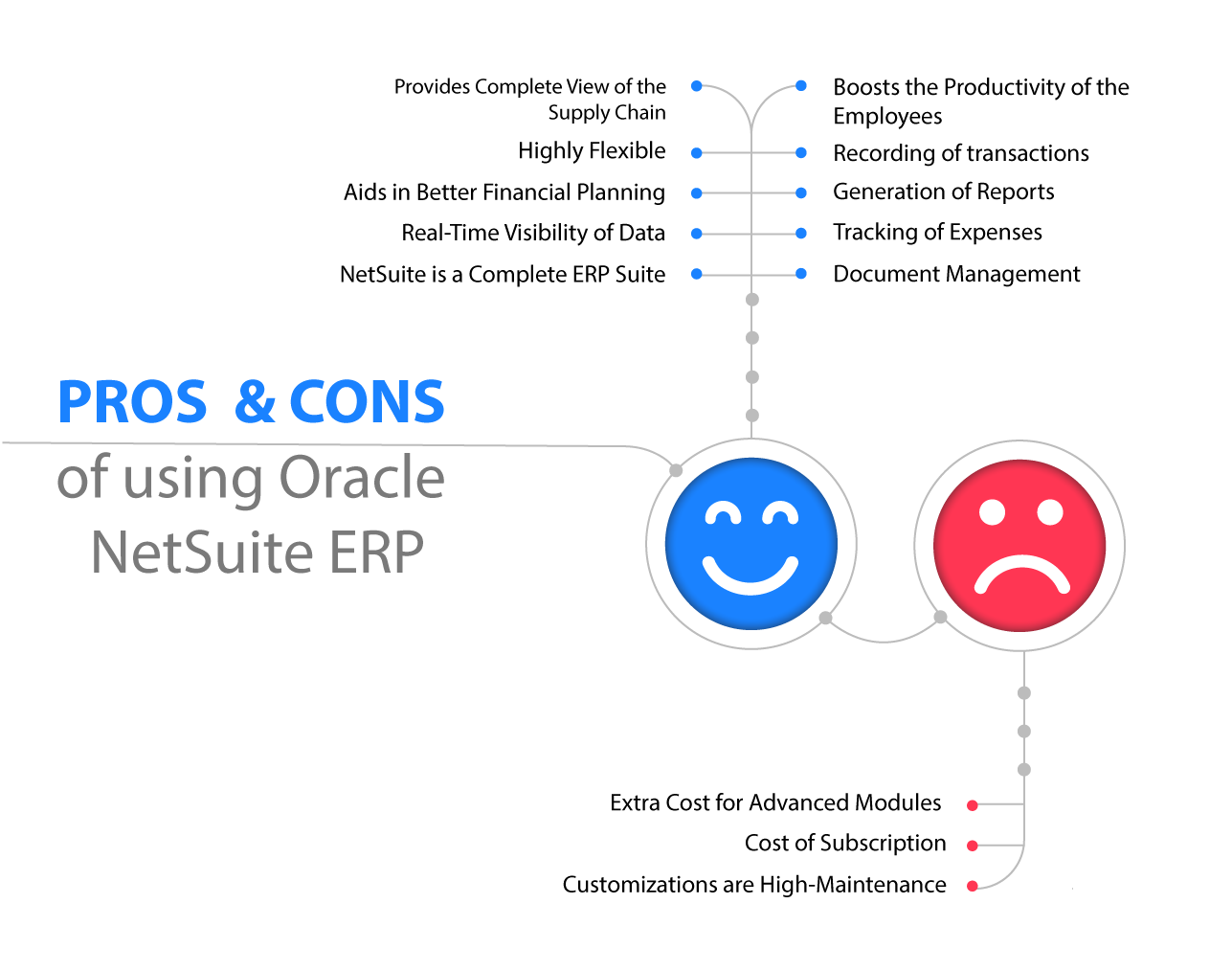In 2025, many businesses are still facing challenges like poor data visibility, manual errors in financial reports, slow decision-making, and disconnected systems. According to recent reports, over 62% of businesses say they struggle with inaccurate data due to outdated software, while 57% report inefficiencies due to their departments work in silos.
To overcome these issues, more companies are investing in Enterprise Resource Planning (ERP) systems. One of the most popular choices is Oracle NetSuite ERP, which now holds a 4.38% share of the global ERP market. Businesses that have adopted ERP solutions report big improvements—95% of them have seen better business processes after making the switch. In this blog, we’ll explore the main benefits and drawbacks of using Oracle NetSuite ERP so you can decide if it’s the right fit for your business.
What is Oracle NetSuite ERP?
Oracle NetSuite ERP is a cloud-based business management software. It helps companies manage key operations like accounting, inventory, order processing, supply chain, and customer relationships—all from one system. This means no more jumping between tools or struggling with slow data updates.
Moreover, NetSuite offers real-time data, smart reporting tools, and easy access across devices, so businesses can track their performance, improve accuracy, and make faster, better decisions. In fact, NetSuite helps companies of all sizes – from startups to big companies. It provides multi-subsidiary activities, multi-currency transactions, and worldwide business management. The platform is flexible enough to be customized and incorporated with other systems.
Pros of Using Oracle NetSuite ERP
Oracle NetSuite ERP provides several benefits to improve business operations. The benefits of NetSuite ERP implementation are listed below:
Get a Complete View Of The Supply Chain
NetSuite ERP provides a complete supply chain view, which is one of its primary advantages. So, for those who are often left in the dark when the context is about which ERP is best for Supply chain management, NetSuite is a fairly good option. NetSuite has a supply chain management module for inventory, manufacturing, and purchasing management, which ensures increased supply chain efficiency. This tool also boosts vendor-customer relationships, which aid in better collaboration.

Enhanced Business Visibility
NetSuite ERP offers modern companies personalized services with customizable dashboards and real-time access to unified customer records. This visibility ensures personalized sales procedures along with a rapid whole business operation with minimum disruptions. Real-time data enables businesses to react fast to market demands and customer requirements.
Aids In Better Financial Planning
Another key highlight of NetSuite ERP is its ability to help with financial planning. In other words, your business would be able to come up with an accurate budget with the insights derived from NetSuite ERP.
With NetSuite, it becomes fairly easy to adapt to the profitability of the organizations and changes in the industry. You would be in a better position to track annual profit targets. So as you can see, NetSuite would actually help you by narrowing the gap between insights and actual figures.
Accelerated Company Growth
NetSuite ERP enables multi-channel business growth by bringing all business components together. This integration allows up-selling and cross-selling and improves the company’s presence among potential buyers. The streamlined processes allow quick expansion and adaptation to brand-new markets to help companies achieve growth objectives easily and quickly.
Time & Cost Savings
The benefits of NetSuite ERP include a reduction in costs and a reduction in time. Eliminating complicated IT systems and several integrations lowers operational costs and shortens development timelines with NetSuite. Simpler project development, sales, marketing, and manufacturing procedures lead to enhanced project output. The saved resources may subsequently be redirected to many other important areas of the company to speed up development and expansion.
You Get Real-time Visibility Of Data
NetSuite ERP provides you with a 360-degree view of the data processing. With the help of this feature, companies can track their customers along with their buying behavior from any part of the world. As a company, you would be able to assess the fundamental contact information related to buying history. With real-time data visibility, you would be able to implement informed decisions, which is a big advantage.
Multilingual Capabilities
Software in several languages is a required prerequisite in a worldwide marketplace for business. NetSuite ERP works with German, Spanish, English, French, Russian & Japanese. This multilingual ability enables companies to work in various areas with no language barriers and in a simpler overseas operation.
Automation for Streamlined Processes
Automation is an aspect of NetSuite ERP which helps in lessening human errors. Automated data entry and process management free employees to work on more strategic and innovative tasks. This results in more consistent and reliable operations, which drive business success.
Centralized Business Processes
NetSuite ERP brings together all your business operations – like finance, marketing, and sales – on one system. This centralization ensures transparency across departments and brings together data analytics and research. Employees need not switch systems to access certain files, facilitating workflow and decreasing information silos risk.
Simple Customization
NetSuite ERP provides over thirty modules and countless add-ons to help businesses build the system to their precise specifications. This flexibility makes NetSuite perfect for numerous industries, helping multinational organizations scale and adjust to new challenges. The ability to adapt the ERP system to the company’s demands is a plus for innovation and growth.
Third-party integrations are Seamless
Integration with third-party systems is yet another NetSuite ERP benefit. It integrates with systems like Amazon, Salesforce, and HubSpot for improved business operations. These integrations help make the ERP a complete and flexible option for companies wanting to simplify their operations.
Cons of Using Oracle NetSuite ERP
Though Oracle NetSuite ERP offers powerful tools and helps improve business efficiency with proper NetSuite consulting service, it also comes with a few drawbacks. The following are the key disadvantages that companies should consider before choosing this ERP solution:
1. High Costs
One of the biggest challenges with NetSuite is its cost. The platform uses a subscription-based model, which means businesses need to pay regularly. These costs can grow over time and may not be affordable for small or medium-sized companies. In addition to the subscription fees, businesses must also pay for the initial setup, customization, and regular updates. Training, technical support, and maintenance can further increase the total cost of ownership.
Read More: A Comprehensive Guide to NetSuite Pricing 2024
2. Extra Costs for Additional Modules
Although NetSuite provides a wide range of features, many businesses find that they need extra modules to meet their specific needs. These add-ons are not included in the basic package and come with their own pricing. As a result, companies often end up spending more than expected. Managing additional modules also means more training, added complexity, and extra investment in IT support, which can affect budget planning and reduce return on investment.
Read More: A Comprehensive Guide To NetSuite Advanced Modules
3. Complex Implementation Process
Setting up NetSuite is not always simple. The implementation process can take several months, especially for businesses with complex operations or multiple departments. Customizing the system to match existing workflows often requires technical knowledge, making the process time-consuming and resource-intensive. In many cases, companies may need to hire NetSuite consultants or experts, which adds to the cost and makes implementation even more challenging.
4. Data Migration Issues
Migrating data from an older system to NetSuite can be a difficult task. Businesses must move customer records, financial data, inventory information, and more—all without errors. This process requires detailed planning and careful validation. For companies with large or complicated databases, even small mistakes during migration can lead to data loss, system issues, or incorrect reports. This risk makes it important to invest in professional support during migration.

Conclusion
Oracle NetSuite ERP is a scalable and robust solution for modern businesses. Its attributes, like financial management, real-time data visibility, and supply chain optimization, make it an asset for companies aiming to enhance productivity and efficiency.
Though high customization costs and subscription fees are challenges, the benefits offered by Oracle NetSuite far outweigh them. In fact, NetSuite’s flexibility and substantial functionality provide companies with the tools to make sound decisions and operate more smoothly.
Partnering with an experienced NetSuite consultant such as VNMT Solutions can further streamline implementation and maximize the platform’s potential. Also, NetSuite ERP enables innovation and growth, especially beneficial for large organizations. Overall, NetSuite is an effective platform for attaining company goals in a crowded industry.
















